Remember seven months ago, when investors were freaking out over North Korea and a future trade war?
They were also wringing their hands over popular volatility funds like the VelocityShares Daily Inverse VIX (XIV), which blew up in February and destroyed millions of dollars of invested cash.
All of these shocks sent the S&P 500 tumbling over 10% in a matter of days!
But if you sold off then, you missed out on huge profits:
The High Cost of Giving in to Fear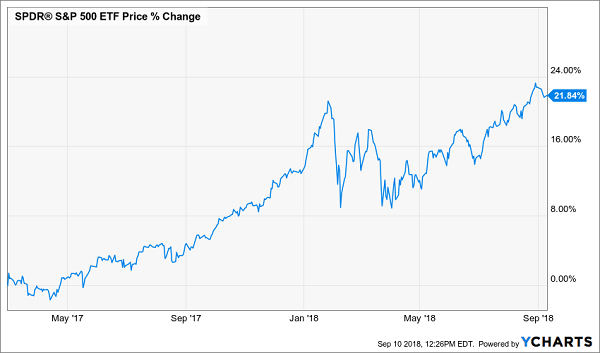
This chart makes it pretty clear that dumping stocks on scary headlines is a terrible idea. But that doesn’t stop a lot of investors from making this same mistake over and over.
Obviously, you should avoid making the mistake the herd is making—but there’s another, much more important, takeaway here: not only should you avoid doing what the masses are doing, you should also find a way to profit from their mistake.
And that’s what we’re going to do today, using a contrarian strategy that’s proven incredibly profitable over the last decade—because it’s driven by first-level investors’ many mistakes.
(I’ve even done the legwork for you, hand-picking 2 funds—below—that let you tap 2 corners ready to “snap back” for big gains now—while paying outlandish dividends of 10%+!)
The 2 Sectors You Need to Watch Now
First, let’s take a look at corporate earnings, which are red hot.
They’ve been hot for a while. As I explained in February (and again in April), corporate earnings are strong. Despite high expectations of 25% year-over-year earnings growth, the vast majority of companies in the S&P 500 are blowing past forecast profits. That’s a key indicator that the strong economy is delivering rising earnings that justify a continually rising stock market:
Earnings Bonanza Continues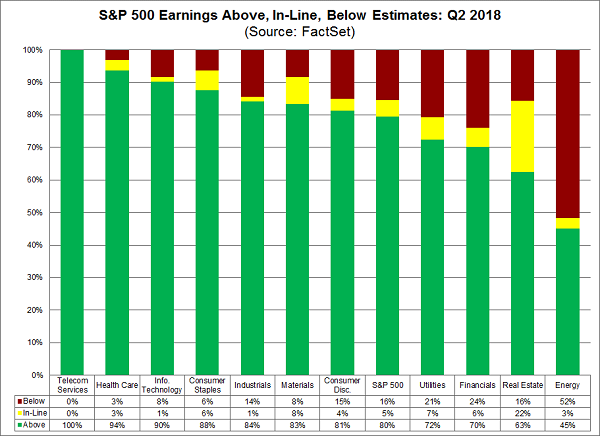
Note how earnings are above expectations pretty much everywhere except energy—which should mean that all sectors except energy will have a strong year-to-date stock performance. But of course, the crazy market isn’t acting logically, so there are some sectors—like real estate and utilities—where stock prices badly lag the fundamentals.
That’s served up some nice contrarian opportunities in those sectors, including the 2 off-the-radar funds I’ll show you now.
Contrarian Pick No. 1: A Steady Eddie Utility Buy With an 11.5% Dividend
Let’s start with utilities.
Looking back, we’ve seen the sector enjoy over 21% earnings growth in the last year, resulting in across-the-board net margins of 11% (some of the highest margins this sector has seen since the financial crisis). Yet utilities have done this in the past year:
Snapshot of a Buying Opportunity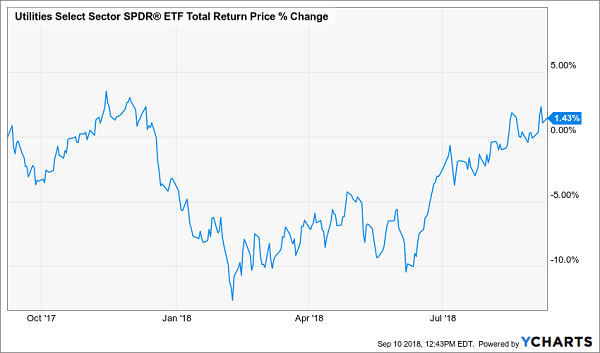
As a result, the P/E ratio for the entire sector has slumped to a meager 17.1, far lower than the broader market’s P/E of 24.9.
This indicates that now is a good time to buy in—and you can do it while pocketing a huge dividend if you choose the Macquarie/First Tr Global Infr/Util Div & Income Closed Fund (NYSE:MFD), whose 11.2% dividend is 3.5 times greater than that of the sector benchmark Utilities Select Sector SPDR ETF (NYSE:XLU).
No, that isn’t a typo—MFD is really paying over 11% to shareholders!
What’s more, this fund’s international exposure gives it tremendous diversification, while its mix of stocks in utilities firms and energy companies (which make up about half of the portfolio), as well as corporate bonds in the utilities and energy sectors, boost its income and provide less volatility than you’d get from stocks alone.
Can we replicate that big income stream with real estate? In a word: yes.
Contrarian Pick No. 2: A Real Estate Play Throwing Off a Steady 10.5% Payout
Consider the Neuberger Berman RE Securities IF (NYSE:NRO), which is paying a 10.5% dividend and offering up exposure to a variety of real estate investments similar to the benchmark Real Estate Select Sector SPDR (NYSE:XLRE). But NRO’s dividend is triple that of XLRE, giving us a much nicer payout than we’d get from the index fund.
And before you ask, no, that high payout doesn’t mean NRO is trailing the index. On the contrary, it is crushing it.
NRO Laps the Benchmark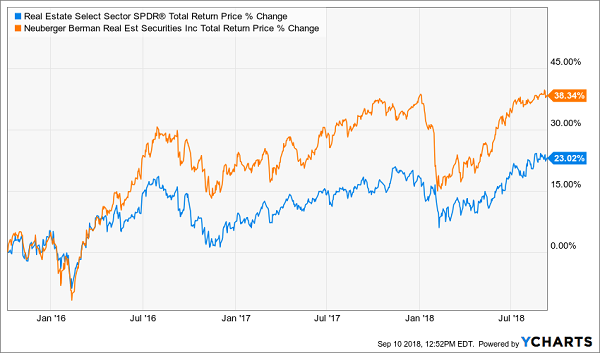
With a total return about 65% greater than the index fund since its IPO, you might wonder why this fund isn’t more popular.
The main reason is that it’s tiny, with about $245 million in assets under management (XLRE, on the other hand, is managing over 10 times as much, with $2.8 billion under its belt). Another reason is that the fund is new—its IPO was less than three years ago.
Both of those factors play straight into the hands of contrarians like us, because they let us bet on a real estate comeback with NRO while taking advantage of the market’s irrational fears—compounding our returns (and tripling up our dividends) as we do.
A Gold Mine of 8%+ Dividends Just Waiting to Be Tapped
How can these 2 funds throw off outsized 10%+ dividends year in and year out? Simple: they’re a special kind of fund called a closed-end fund (CEF).
In a nutshell, these often-ignored income plays routinely throw off dividends of 8%, 10% and higher, but they’re way too often ignored by investors.
Why?
Well, like NRO, many of these funds are tiny, so they get next to no coverage from analysts and the business media.
That’s too bad for the herd, but it’s great for us, because it lets us grab an early position and start collecting these incredible double-digit CASH payouts. Then we can sit back and watch as other investors pile in, driving our initial investment higher.
Best of all, there’s a dead simple “profit alarm” that goes off every single time this is about to happen!
“The Most Reliable Profit Indicator I’ve Seen in Investing”
It’s called the discount to net asset value (NAV), and it’s easy to find on any fund screener. We don’t have to get into the weeds here—all you really have to do is buy when this discount is unusually wide, then ride it to huge gains.
This is, hands-down, one of the most reliable profit indicators I’ve seen in investing.
Just look at what happened with an obscure CEF called the PIMCO Dynamic Credit Income Fund (NYSE:PCI), payer of an 8.1% dividend as I write.
This unsung fund recently did something unheard of for a high yielder: it exploded for a stunning 46% GAIN (including dividends) in just 15 months!
The Profit-Making Power of CEFs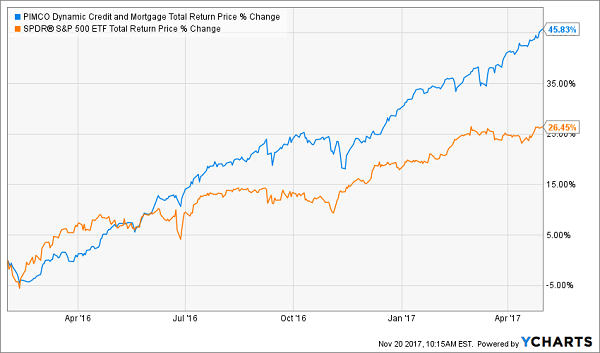
The great thing is that this gain was easy to spot ahead of time, because PCI was trading at a ridiculous 14% discount to NAV (or the value of its underlying portfolio).
The next move was simple: BUY—and cash in as the gap between PCI’s market price and NAV narrowed—which is exactly what happened:
Slamming Discount Window Drives Massive Gains
The Next 5 Winning CEFs (with 8.2%+ dividends)—Yours FREE
I’ve seen narrowing discounts like this generate huge gains in CEFs time and time again, and my team and I have just released 5 CEFs we see as the next PCI—primed for fast 20%+ price gains as their ridiculous discount windows slam shut, while handing you 8.2%+ average cash dividends.
I’m ready to GIVE you the names of these 5 blockbuster picks now! All you have to do is click here and I’ll give you instant access to all my research on these 5 income powerhouses—their names, ticker symbols, buy-under prices and much more.
But you must act soon. These 5 funds’ absurd discount windows are already starting to slam shut, so every day you wait erodes your gain just a little bit more. Don’t miss out!
Disclosure: Brett Owens and Michael Foster are contrarian income investors who look for undervalued stocks/funds across the U.S. markets. Click here to learn how to profit from their strategies in the latest report, "7 Great Dividend Growth Stocks for a Secure Retirement."
